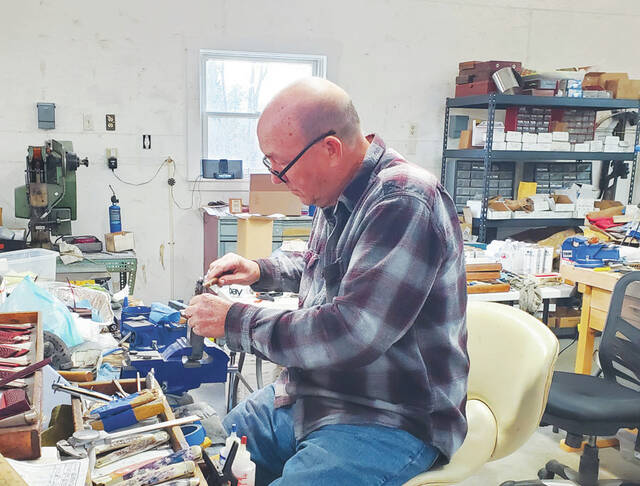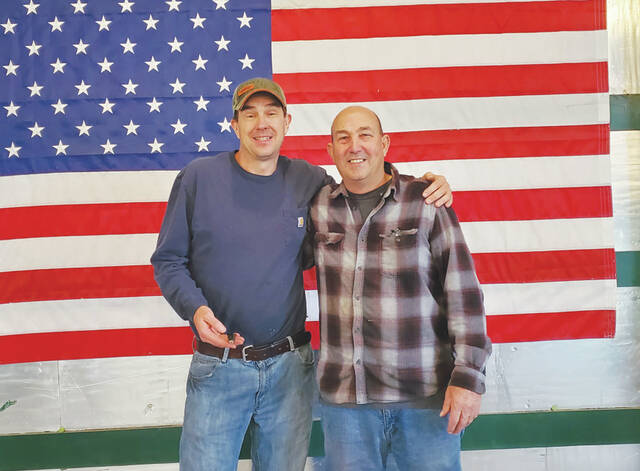By Ashley McCarty
People’s Defender
Cooper Cutlery, LLC, of Winchester, Ohio, has rapidly ascended in popularity by making knives with vintage techniques and superb craftsmanship.
The Cooper Cutlery company began its race for nationwide notoriety in 2018 after acquiring factory items of longstanding knife mogul Queen Cutlery.
Before there was Queen Cutlery, there was Schatt and Morgan Cutlery. Schatt and Morgan, led by John Schatt and Charles Morgan, began originally in Gowanda, Ny., in 1895. In the fall of 1902, the company moved to Titusville, Pa. In January of 1903, the plant officially opened for production.
Between 1903 and 1905, the company grew tenfold. In addition to cutlery, they began manufacturing razors and door hinges of cold-rolled steel, the first of their kind.
With company expansion, Schatt and Morgan installed electric machinery in 1906, which allowed them to double their already large workforce of 100 employees.
In 1911, Morgan bought out Schatt. During World War I, Schatt and Morgan manufactured 30,000 clasp knives for the U.S Navy. Following the war and hard times, Schatt and Morgan were purchased by upstart Queen City Cutlery, founded by five Schatt and Morgan employees.
By February 1922, Queen City Cutlery was so popular that it was able to hire fifteen men to produce 300 dozen knives per week. By the late 1920s, the company had thirty employees and was using Cyclops steel in their knives. In 1933, it was announced that Queen City Cutlery bought the Schatt and Morgan buildings, real estate, and finished and partial stock.
The two cutlery giants were finally one.
At the onset of World War II, the U.S. government immediately began sending orders to Queen City Cutlery. Queen City Cutlery manufactured folding pruning knives with hooked blades for the Army Air Force, pocketknives for the Army and Navy, a leather-handled hunting knife and a machete for the Navy Seabees for use in the Belgian Congo.
Shortly after the war, the company changed its name to Queen Cutlery and began using their quintessential steel, “Queen Steel.”
The next year, Morgan died at the age of 84. The company remained strong for the next few decades under new leadership. In 1969, Queen Cutlery was bought by Servotronics as a subsidiary company.
It existed as such for 43 years until the Daniels Family Cutlery Corporation bought Queen in September 2012. On January 10, 2018, it was announced that Queen Cutlery closed to reorganize due to issues with “cash flow.”
“Oil was struck in Titusville, so they called it the “Queen City.” They made knives for nearly every knife company around then. Queen Cutlery., over 100 years, made some of the best knives in the United States. They made Winchester, Primble, Kinfolks, Case Classic, every major knife was made by Queen Knife Co. In 2018, the Daniels family filed bankruptcy,” said Cooper Cutlery, LLC., Owner Gilbert Cooper.
An avid collector and lover of knives, Cooper decided to attend the sale.
“When they decided to sell the contents of the factory, I decided to go to the sale. My friend, Tim Scott, was going to go with me. He runs Bluegrass Cutlery in Manchester, Ohio. Well, he couldn’t make it, so my son Seth and I went. We pretty much bought everything in the factory. There were a few things that helped us buy it,” said Cooper.
One – the factory was allegedly haunted.
“Second, there was no running water, bathrooms or electricity. It was raining, the weather was bad, and that old building was dirty and supposedly haunted. It got a lot of people out of there. The sale went on until 11 o’clock at night. So, we got some really good deals. I was so tickled,” said Cooper.
After buying the factory contents, Cooper had considered keeping the company in Titusville.
“They already have a knife company, though. So, we were looking for a building around here to put it in. We rented a warehouse in Titusville to house all the machinery for about six months. It took five semi-loads to get it here and six trailer-loads. It was a tremendous amount of work,” said Cooper.
Cooper attended the sale on June 1, 2019, and by June 2020, after sorting through the plethora of materials and setting up the machinery, the company was in full operation.
“COVID-19 had hit and they shut down Pennsylvania, so we couldn’t get some of the semis out. But, we did get some of the essential machines. When we bought the machines in the factory, there were some knives put together but not finished. We took a lot of those and finished them while we were setting up the factory. It was quite an undertaking, but I’m so glad that we did it,” said Cooper.
A decade ago, Cooper had learned the artistry behind knife making.
“About 10 years ago, a friend of mine, John Parker — he and Kevin Pipes started Smoky Mountain Knife Works — sold me about 4,000 knives that weren’t done. I set up a garage on my property and taught myself how to make knives. I read a lot of books and watched a lot of videos. It drives my wife crazy,” Cooper said, laughing.
Once the company was in operation, Cooper took in sons, Seth and Matthew, under his employ and taught them how to make knives. Including himself, there is four employees total under Cooper Cutlery, LLC.
“In order to make knives, you have to own trademarks. In August of 2019, after we bought the contents of the factory, the trademarks went up for sale. We purchased the trademarks online. It didn’t matter what the trademarks went for, because we had all of the equipment and knife parts. In the process, we acquired other trademarks. Once we purchased the trademarks, we could register them to Cooper Cutlery, and begin making those knives. Once you acquire those trademarks, you have to start making the knives to make the trademark active,” said Cooper.
Since June of 2020, Cooper and his three employees have produced 5,000 knives.
“When we bought these contents, the goal was to keep it in the United States and make the same knife that grandpa carried, out of the same steel, how it was made a century ago. That’s what we’re doing. We have better adhesives now, but still, we’re sitting there making every knife by hand. I think people will appreciate that. Some of our machines are 100 years old. I love getting up in the morning and coming here to work. I can’t get enough of it. I eat and sleep these knives,” said Cooper.
Along with making the knives traditionally, the sourced materials are also handcrafted.
“We make our own hand materials out of whitetail, buffalo horn, camel bone, different local woods and even wooly mammoth parts. We’ll use teeth and tusks. We also dye our handle material. We use walnut hulls, pokeberries; very primitive methods,” said Cooper.
While whispers had already started circulating from the purchase of these factory items, Cooper Cutlery, LLC, solidified its name in the knife world when its products hit the televised market.
“People that collect run in the same circle. I’ve always bought and sold Native American artifacts. So, I knew some of the major knife collectors through the artifact world. I was good friends with John Parker, Kevin Pipes, Dave Scott and Phil Martin of Blue Ridge Knives, the main players in the knife industry. When we started making knives, we started hoarding them. We made about 4,000 knives before we sold the first one. We called the guy that runs the Cutlery Corner Network, told him who we were, what we do, and he wanted a sample. When I sent him a sample, he called me back and said, ‘we’ve got to have this knife,’” said Cooper.
Cutlery Corner Network bought 100 knives. In five days, they were completely sold out.
“Since then, people have been calling from all over. This week we’ve probably shipped out over 500 knives. It’s been insane. We can’t make them fast enough,” he said.
While Cooper Cutlery, LLC, doesn’t have a website yet, their products can be found at Eagle Valley Cutlery in Ripley, Ohio, and 68 Bait and Tackle in Mt. Orab, Ohio.
“We’re making American knives for American people,” said Cooper.






